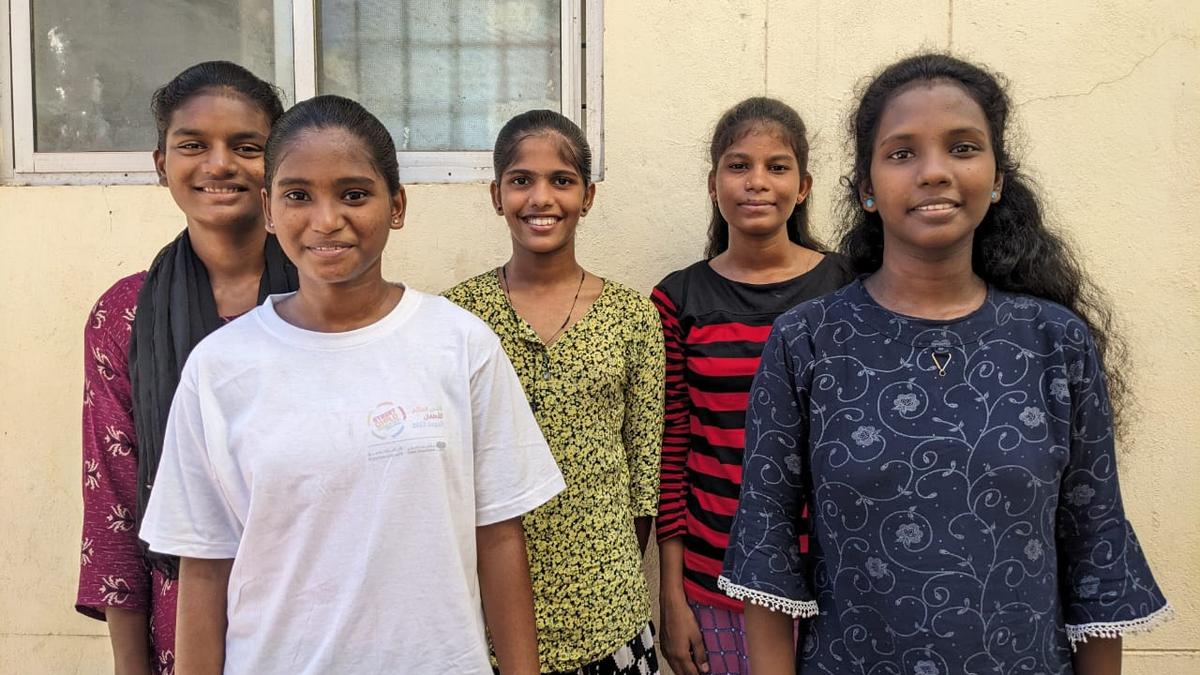
Five girls from homeless shelter emerge victorious in Class X board exam
The Hindu
V. Pavithra and four other girls from an Urban Homeless Shelter in Chennai overcome obstacles to pass exams.
V. Pavithra is all smiles after seeing her Class X board exam results. “I want to pursue computer science and use it to further pursue football,” she said. Ms. Pavithra is one of the five girls to clear the exam from the Urban Homeless Shelter for Girls located on the Communicable Diseases Hospital campus in Tondiarpet.
It wasn’t an easy task for M. Kavya, C. Poongodhai, B. Anbarasi, S. Saranya, and Ms. Pavithra to clear the public exam as they were under constant fear of being without a home. The Greater Chennai Corporation (GCC) had decided to shut down the shelter a little over a year ago.
“Over five years ago, I was rescued from the streets. Residing in this shelter has not only given me the safety to study but also an environment where I was able to think about other aspects of life with my friends,” said Ms. Pavithra, who scored 327 out of 500.
So, when they heard the news that they might not have a place to stay soon, the girls took it hard. “Their focus on studies took a hit as they had to grapple with their future. Some had decided to go back to their life on the street,” said P. Jennifer, the shelter’s coordinator. But soon news arrived that the GCC had decided to keep the shelter running, ensuring that the children were able to pursue their studies.
The girls would wake up at 4 a.m. to prepare for the exam before heading to school and then return to study until 10.30 p.m. The school too held special classes for them till 6.30 p.m., and sometimes even on Sundays, to prepare them for the exam. “Maths is my favourite subject. It’s just so much easier to crack the questions than preparing for social science,” Ms. Saranya said.
All five girls want to pursue a career in sports as they are already part of the Street Child Football and Cricket teams.
“In providing such a space for children, it also ensured that they had opportunities that they could take advantage of – be it safety, sanitation, or studies. The GCC Commissioner J. Radhakrishnan understood the importance and helped us out,” said Paul Sundar Singh, secretary of Karunalaya.

“Writing, in general, is a very solitary process,” says Yauvanika Chopra, Associate Director at The New India Foundation (NIF), which, earlier this year, announced the 12th edition of its NIF Book Fellowships for research and scholarship about Indian history after Independence. While authors, in general, are built for it, it can still get very lonely, says Chopra, pointing out that the fellowship’s community support is as valuable as the monetary benefits it offers. “There is a solid community of NIF fellows, trustees, language experts, jury members, all of whom are incredibly competent,” she says. “They really help make authors feel supported from manuscript to publication, so you never feel like you’re struggling through isolation.”

Several principals of government and private schools in Delhi on Tuesday said the Directorate of Education (DoE) circular from a day earlier, directing schools to conduct classes in ‘hybrid’ mode, had caused confusion regarding day-to-day operations as they did not know how many students would return to school from Wednesday and how would teachers instruct in two modes — online and in person — at once. The DoE circular on Monday had also stated that the option to “exercise online mode of education, wherever available, shall vest with the students and their guardians”. Several schoolteachers also expressed confusion regarding the DoE order. A government schoolteacher said he was unsure of how to cope with the resumption of physical classes, given that the order directing government offices to ensure that 50% of the employees work from home is still in place. On Monday, the Commission for Air Quality Management in the National Capital Region and Adjoining Areas (CAQM) had, on the orders of the Supreme Court, directed schools in Delhi-NCR to shift classes to the hybrid mode, following which the DoE had issued the circular. The court had urged the Centre’s pollution watchdog to consider restarting physical classes due to many students missing out on the mid-day meals and lacking the necessary means to attend classes online. The CAQM had, on November 20, asked schools in Delhi-NCR to shift to the online mode of teaching.









